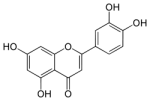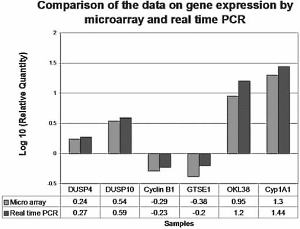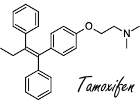|
Definition: "An ergogenic aid is any substance or phenomenon that enhances performance "
|
|
||||||||
04.09.2015 |
|
|
Animal study: luteolin lowers estradiol level
Luteolin, a flavonoid found in rosemary, thyme, parsley and citrus fruits, is an effective anti-oestrogen, according to an animal study published by researchers at Peking University Health Science Center in the Journal of Pharmacology and Experimental Therapeutics. Unlike pharmacological anti-oestrogens, luteolin also improves the cholesterol balance.
Luteolin
Study
Some animals were given luteolin [LUT] as well, administered orally. The doses used are shown in the figure below. The human equivalent of the doses varies from 45 – 450 mg luteolin per day. Some mice were also given injections of letrozole [LET], a powerful pharmacological aromatase inhibitor.
Results
The researchers had also injected the mice with estradiol-sensitive breast cancer cells. Both luteolin and letrozole inhibited the growth of the tumours, but letrozole performed slightly better at this than luteolin.
Long-term use of pharmacological aromatase inhibitors leads to side effects, one of which is that the cholesterol balance becomes worse. The LDL concentration increases and that of HDL decreases. Luteolin also inhibits aromatase, but this flavone has the opposite effect on cholesterol balance. Luteolin lowers the LDL concentration and raises the HDL concentration.
The figure above shows that luteolin can also cancel out the negative effect of letrozole on cholesterol levels.
Luteolin had no effect on triglyceride levels.
Conclusion
"As a high LDL/HDL ratio is usually associated with long-term use of aromatase inhibitors, the administration of luteolin can be a potential compensation mechanism without compromising on aromatase."
Source:
More: Archives:
|
|
||||||||||||||||







